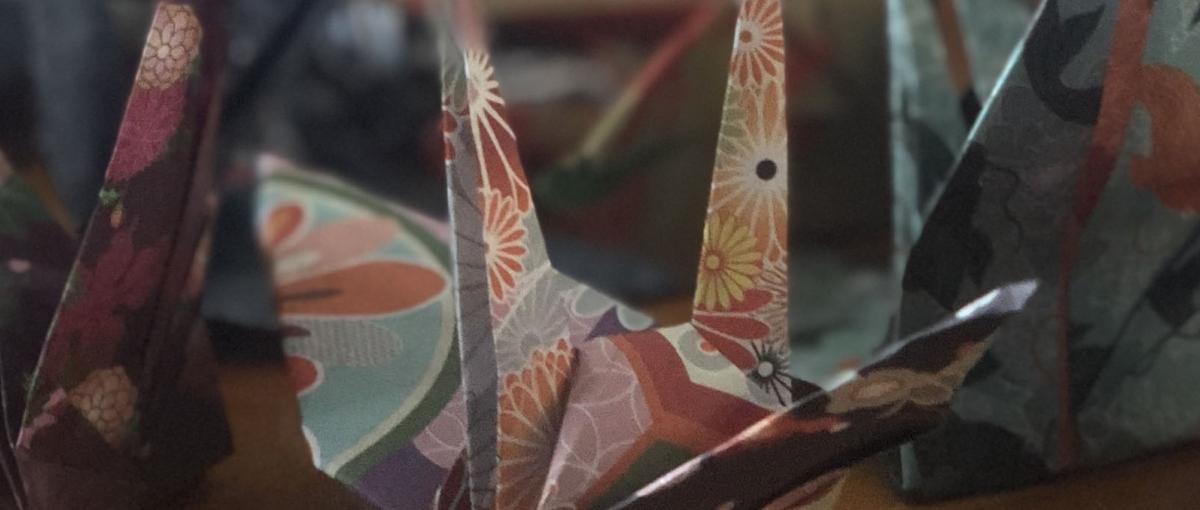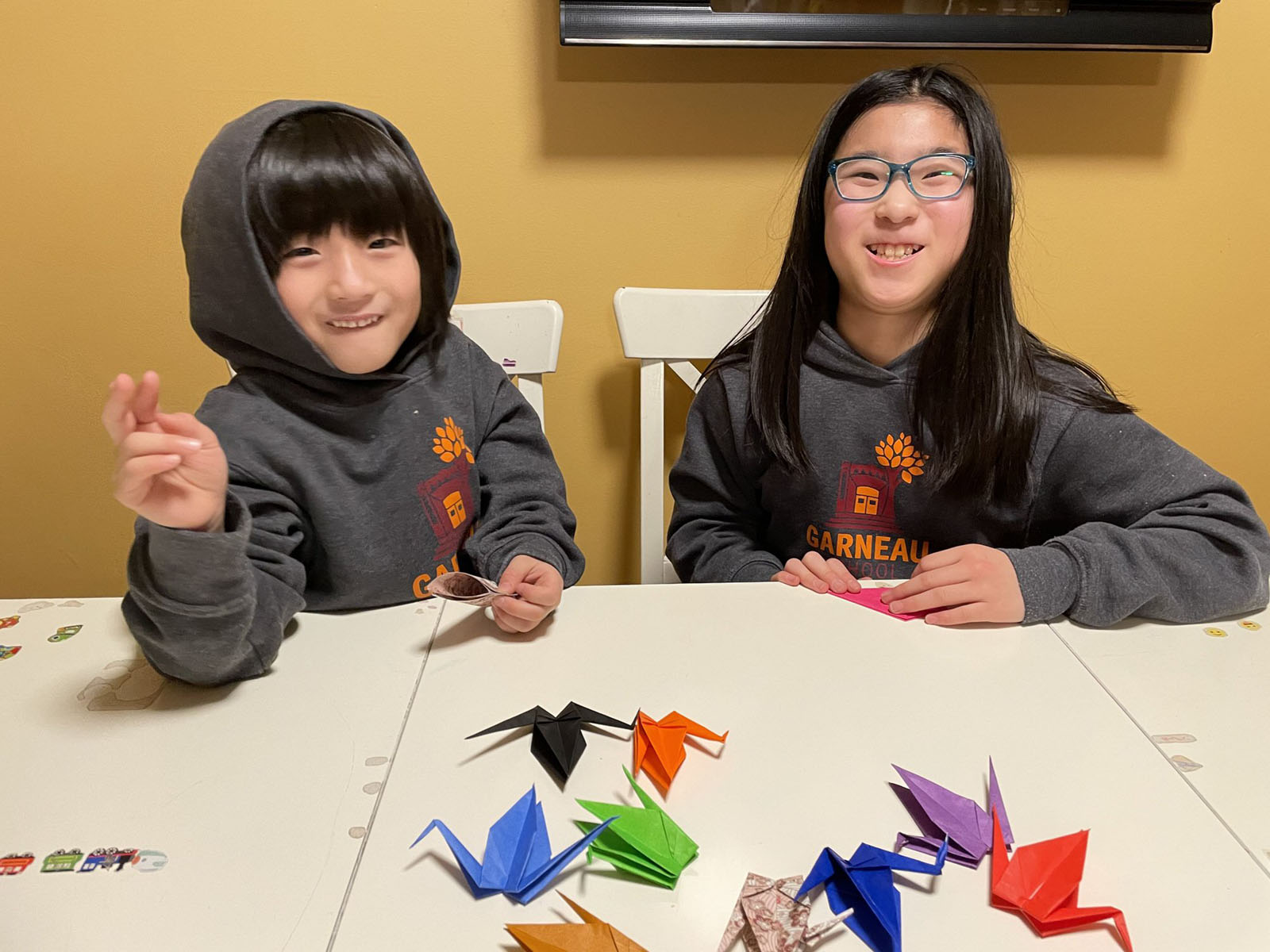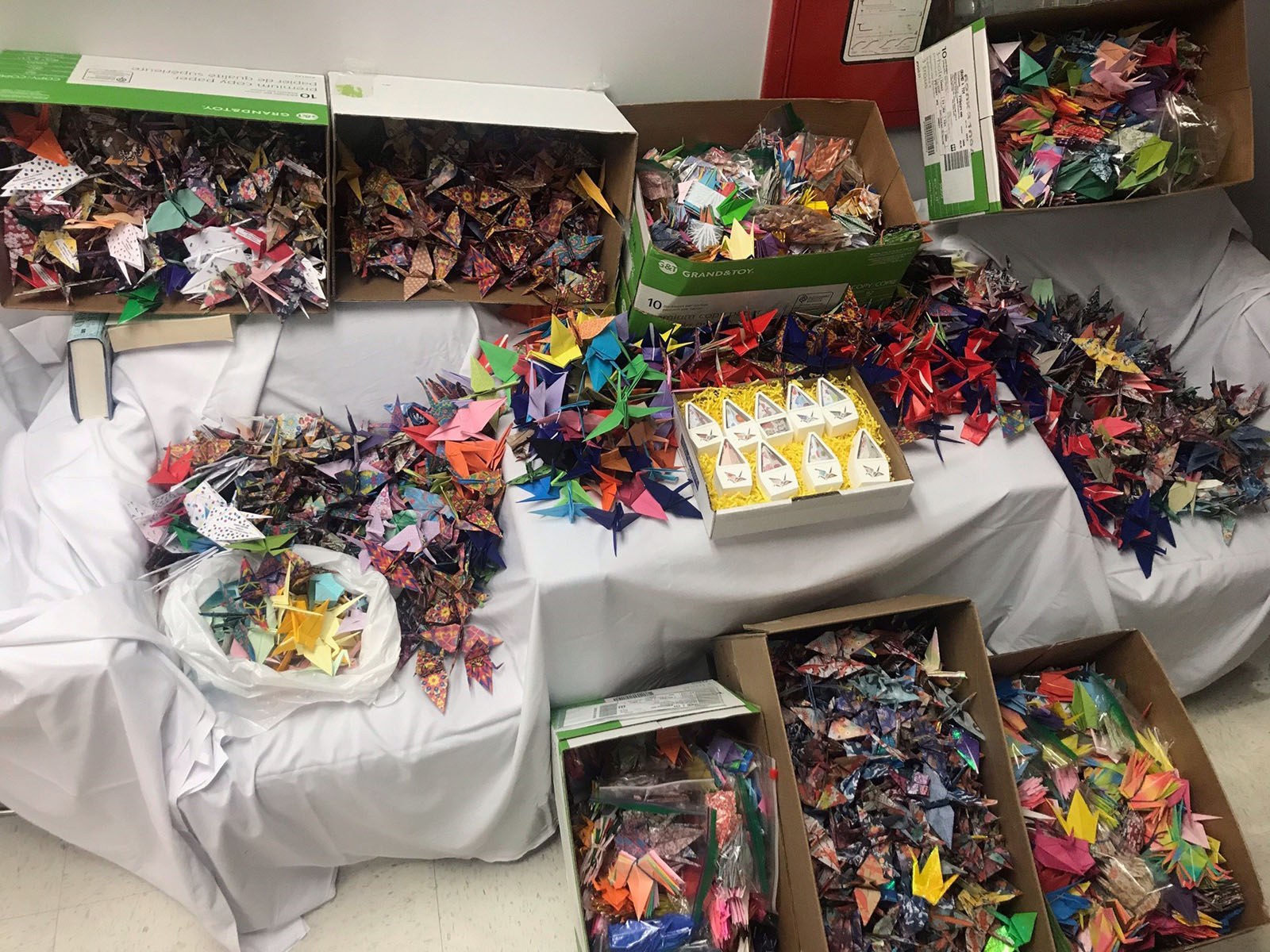Origami brings hope
Paper crane campaigns lift spirits of staff and patients during COVID-19

April 1, 2021
By Brenton Driedger, Social Media and Storytelling Advisor, Covenant Health
Gagan Gill’s eureka moment came one night as she was doing origami at home.
As she flipped through the pages of her instruction booklet, she discovered a design for an origami crane. It reminded her of how fellow students in her high school had made 1,000 cranes for a teacher whose wife had a terminal illness.
“The things that it symbolizes are peace, hope, love, and it’s given to people who are sick, and it’s a wish for hope. It’s a wish for health,” says Gagan, 23. “And instantly, I just thought, ‘Oh my goodness, wouldn’t this be such a great gift to give to people who are struggling with COVID?’”

Families and children from the Edmonton Japanese Community Association enjoyed making the origami cranes.
Prior to the pandemic, Gagan would visit patients at the Misericordia Community Hospital for two hours each week. She missed being with the patients and thought receiving origami cranes might lift their spirits. That same night, she sent Misericordia volunteer coordinator Espie Alvez a “massive email” proposal. And on Easter Sunday, her idea will culminate with the delivery of more than 5,000 cranes to patients and staff at the Misericordia and Villa Caritas as well as several long-term care homes.
The tradition of 1,000 cranes has become well known because of the story of a Japanese girl, Sadako Sasaki, who developed leukemia after being exposed to radiation from the atomic bombing at Hiroshima. During her time in hospital, she folded hundreds of origami cranes. Today, the cranes remain a symbol of peace and are a common sight at Hiroshima memorials. Friends and family will often make 1,000 cranes for a loved one who is ill to wish for their recovery and health.
As Espie began asking other volunteers to participate, she worried that making 1,000 cranes might be a challenge.
“We started by trying to make the origami cranes, and I can tell you I’m all thumbs! So the first origami crane that I made really looked terrible.”
Espie also invited local schools to participate and approached the Edmonton Japanese Community Association. Sanae Ohki, an association director who looks after cultural programs, shared the request with members.
“It’s a good way for us to wish patients hope, peace and wellness,” says Sanae. “By making origami cranes, we can encourage these people that we are here and that we are thinking about you.”
Espie and Gagan’s goal of reaching 1,000 cranes was quickly met. By the time all the cranes were received in mid-March, hospital volunteers alone had submitted about 1,200, Gagan and her friends and family had made about 1,000 and the Edmonton Japanese Community Association had contributed nearly 3,600.
“When we gathered everything together, we had more than 5,000 cranes. We could not count anymore,” says Espie.
Espie needed about 900 cranes so that each patient and staff member at Villa Caritas and the Misericordia hospital could receive one. She began offering the extras to seniors’ homes in the community. Each crane was quarantined for five days so it could be safely distributed. Volunteers added a sticker with an encouraging message to each crane, which will be handed out on Easter Sunday.
“The more patients we can bring some light to, the better. I’m just so happy,” says Gagan. “It’s the little things that matter, that make a difference. It’s the tiny gestures. There is someone wishing for hope and peace and love, and I hope that the patients see that — as someone looking out for them.”

Volunteers submitted more than 5,000 cranes.
Six weeks earlier, a different origami campaign helped lift the spirits of staff at the Edmonton General Continuing Care Centre. Colleagues in professional practice wanted to show support to frontline staff who had dealt with a COVID-19 outbreak. Their team made 1,000 cranes and included an encouraging quote in each one.
“Inside each crane was tucked a message of hope, just something to hang your hat on when you were having a rough day,” says Lynn Klein, senior director of operations, who keeps her crane on her desk. “It’s wonderful to feel the support and know that you’re part of a larger team.”
Corina Walker helped distribute the Edmonton General cranes, which were delivered on Random Acts of Kindness Day, Feb. 17.
“They were all very excited,” says Corina. “People were really touched that someone was reaching out and thinking of them through all of this.”
Gagan noticed that her friends and family found a personal benefit in making the origami cranes.
“A lot of them would shoot me a text and say, ‘This is so therapeutic. If you need any more, I can make 50.’ And I thought, ‘That’s why we’re getting this overwhelming response. This isn’t just volunteering your time to make a gift. This is also a time for people to unwind, and it’s therapeutic for them as well.’”
Espie is thrilled by the community response and is grateful for the continued support of volunteers, even though they’re not able to be with the patients in person.
“Our volunteers have always wanted to reach out to patients,” says Espie. “That spirit is still there with them. It never really left them. When you suggest a project to them which they can do at home, where they can still provide some happiness to the patients, they are very, very willing to do it.”